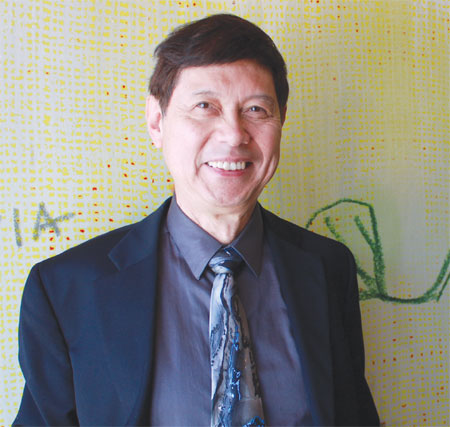Helping Chinese Americans move into mainstream
Updated: 2014-06-06 11:50
By Qidong Zhang in San Francisco(China Daily USA)
|
||||||||
|
Chester Wang has a lot of advice for Chinese Americans. Qidong Zhang / China Daily |
Chester Wang has a lot of advice for Chinese Americans: register to vote; participate in community service; become politicians who understand and represent Asian Americans; and become journalists who deliver a voice to the main stream.
And the advice-giving from the 67-year-old successful Silicon Valley real estate entrepreneur and Acorn Campus investor doesn't stop there.
"As Chinese Americans living in the US, it's utterly important that we become part of the community, and make sure we do not take and take and take from the community. We need to think about giving, and if we do not do it, our children will pay. If we do more now, our children will have more rights to enjoy.
Wang emphasized that most Chinese Americans don't realize the most important rights they have are in their hands: the power to vote and the power to participate.
"Imagine if we have 50,000 registered Chinese-American voters in a city and 48,000 of us vote. Which politician would ignore such a group? We can be a powerful group if we vote to show our power. Every one of us should know that whether our children are liabilities or assets of society depends on what we do today," he told China Daily in an interview.
"Chinese Americans will always be second-class citizens if we limit ourselves by not voting, taking from instead of giving to the community, going for money-making careers instead of doing public service in America, and not volunteering our voice in the main stream media," he said.
Modestly claiming himself as having "more failures than success when it comes to business and politics," Wang says Chinese Americans learn about US politics mostly the hard way.
"I read about 20 years ago that the New York City Council once approved building a rehab center right next to Chinatown, which was practically putting a jail next to where Chinese Americans were living. It happened because according to voting records, only 700 of 100,000 Chinatown residents voted. The plan was eventually reversed, but the lesson is bitter enough for every one of us to learn today," he said.
Wang took a very different path than most students from Taiwan in the early 1970s when it came to a career choice. A 1969 graduate of Taiwan Tsinghua University with a degree in physics, he remembers his mother sewing $300 exchanged from the black market into his pants when he left Taiwan for the US to study.
Obtaining his PhD in physics from the University of Oregon in 1974, he chose to teach computer science in Saudi Arabia instead of going into the job market. "I was 27, single and wanted to see the world," he said.
One year of living and extensive travel in the Middle East and Europe was an eye-opening experience for him. "I saw how water was more expensive than oil, I met with a contractor who has over 48 PhD engineers working for him, and I heard friends talking about real estate property appraising 4,000 times within a year. "
He returned to the US in 1975, eager to study for his MBA at San Jose State, and soon started a real estate agency and remodeling business. In 1991, he and his brother Stanley, another Tsinghua graduate, built the first and then largest shopping plaza, which had as its anchor store 99 Ranch Market, in San Jose in northern California. 99 Ranch Market has become the most popular grocery chain store in California. It also was the largest Asian shopping mall then - 130,000 square feet - in northern California, with daily traffic of approximately 6,000 people. It fundamentally transformed the traditional mom-and-pop retail business into a commercial shopping plaza with its modern IT and high-tech concept. The mall also became an alternative to San Francisco's Chinatown for Silicon Valley residents who had to spend 40 minutes driving there to get authentic Chinese food.
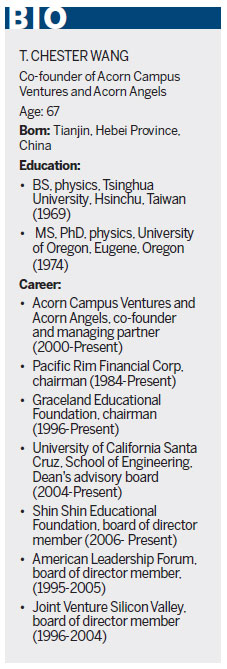
His business instinct then drove him toward senior housing because he was conscious of the needs of the baby-boomer generation. He raised funds and built 88 condominium units which lead directly to the 99 Ranch Market in Silicon Valley. And he also focused on developing housing for seniors in China, where he is building a five-story complex in Kaifeng city of Henan Province, providing Western quality of living standards in China.
If the law classes in the MBA program he took taught him a citizen's power and responsibility, it was real estate development that put him directly in dealing with local government, from city planning to decision makers such as city councilmen or mayor.
"I found myself becoming friends of Susan Hammer who was running for San Jose mayor at that time; Ron Gonzalez, who was the 63rd mayor of San Jose and the first Hispanic mayor since 1850 in California, Steve Westly (2003-2007 California state controller and CFO); and Mike Honda, current US Congressman. I soon became familiar with concept of campaigns, diversity voting issue for all races, minority rights, and neighborhood campaigns. Susan Hammer, for example, became mayor (1991-1999) because she won 70 percent of the minority votes with the help of our heavy campaigning for minority and swing voters."
According to Wang, that experience made him understand how mainstream America views Chinese Americans, and he has devoted more effort to community service since the 1980s.
Wang also calls for nurturing American-born Chinese politicians who understand the culture, represent minority rights and speak for the mainstream population. He believes Chinese Americans should also encourage the young generation to pursue media careers in the US.
"Media is the voice and tongue of our group, whether it's print or broadcast or social media. We need to have our own voice," he said. "Chinese parents tend to encourage their children to pursue professions such as lawyers, doctors, accountants so that they will not starve. But politics and media are essentials to our better survival in this land of opportunity. If the main stream media such as the San Jose Mercury News reports daily stories on Chen, Zhang, Zhao and Wang, the main stream gradually will not consider us as somebody out of the mainstream, and the general public will learn to accept us. Our image is dependent on our own making. Our goal should be helping Chinese Americans become part of the mainstream. If we don't do it, our children will be the ones who suffer and be treated as second-class citizens."
From his experience of building a commercial shopping plaza such as 99 Ranch Market, Wang said China's economic power today is changing the culture and retail shopping habits in Silicon Valley and elsewhere.
"When you have strong economic power, people pay attention to your culture strength. More Americans are learning Chinese language, culture and even medicine today, which we did not anticipate a couple of decades ago. Chinese acupuncture, for example, is being practiced widely in the San Francisco Bay area and in many parts of the US, and the trend is growing. If we combine that part of culture strength with the good part of American culture, our political and economic power will be admirable."
Wang has three sons and one daughter. His eldest son Justin is a graduate of Temple Medical School in Philadelphia and is an emergency doctor; his daughter Andrea, a graduate of UC Davis is a communications manager for the Disney Family Museum in San Francisco; his son Anthony is studying at USC's medical school and his youngest son Jeffrey is a graduate of Berkeley in bio-engineering and works for a micro private-equity firm in Sunnyvale, California. Wang and his wife Olivia, a family doctor, live in Los Alto Hills, California.
Kellyzhang@chinadailyusa.com
(China Daily USA 06/06/2014 page11)

 Daredevil dancer conquers mountain
Daredevil dancer conquers mountain
 Chinese float gives joy at Macy's parade
Chinese float gives joy at Macy's parade
 Calm comes to troubled Ferguson
Calm comes to troubled Ferguson
 6 things you should know about Black Friday
6 things you should know about Black Friday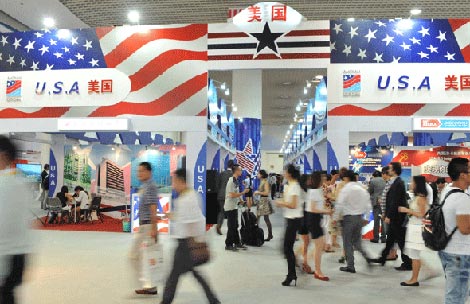
 Visa change may boost tourism to the US
Visa change may boost tourism to the US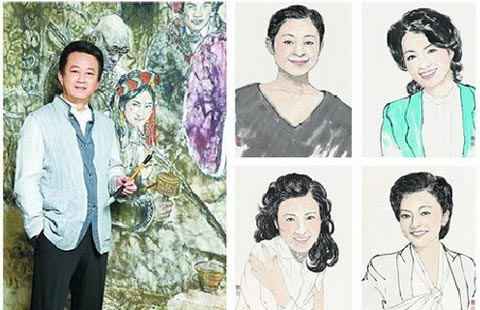
 China's celebrity painters
China's celebrity painters
 Beauty of Beijing float making debut in Macy's parade
Beauty of Beijing float making debut in Macy's parade
 Rescue dogs show skills in NW China
Rescue dogs show skills in NW China
Most Viewed
Editor's Picks
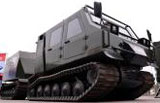
|

|

|

|
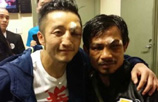
|

|
Today's Top News
China, US fight terror on the Internet
How to give is focus of philanthropy forum
China, US diverge on approaches to nuclear energy
China's local govt debt in spotlight
Macy's looks to appeal to more Chinese customers
Clearer view of Africa called for
Cupertino, California council is majority Asian
BMO Global Asset Management Launches ETFs in Hong Kong
US Weekly

|

|
